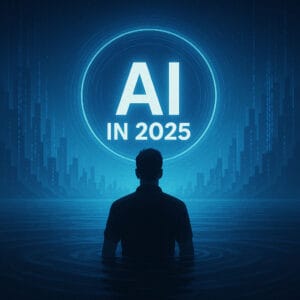Artificial Intelligence in 2025 is no longer about incremental upgrades. It’s a seismic shift. From autonomous agents to deeply personalized digital experiences, AI in 2025 marks a leap in both capability and consequence. If 2024 was the year of experimentation, 2025 is the year AI floods in—quietly at first, a little water around your feet, then up to your neck before you even notice.
In this article, we break down seven breakthrough developments that define AI in 2025 and explain why they matter now more than ever. From advanced reasoning to multimodal systems, personalized AI to wearables, the landscape is rapidly transforming.
What’s most striking isn’t any single innovation—it’s the pace of change. Like the early days of the internet, change is constant and direction unpredictable. Anyone who claims to know exactly where AI is going is selling you a fantasy.
Seven Breakthroughs Reshaping AI in 2025
As AI systems evolve, they’re reshaping how we interact with information, environments, and one another. These seven breakthroughs reveal the scope—and stakes—of what’s coming. And they provide a hint of where we are headed in what remains an unknowable future.
1. AI Thinks Before It Speaks: Advanced Reasoning and Reflective Thinking
The latest AI models, including OpenAI’s GPT-4.5 and Gemini 2.5 Pro, have moved beyond reactive outputs. These systems can reason through complex, multi-step problems, plan their own responses, and reflect on possible alternatives. And they do while creating a more natural user experience. This is revolutionizing everything from legal analysis to scientific modeling. Educators, researchers, and engineers are already relying on these capabilities to accelerate problem-solving at scale.
Implication: The Singularity may still be a fantasy, but reasoning engines are closing the gap between artificial and human cognition. The real question here is not when generative AI will match human reasoning – this is just Silicon Valley’s favorite guessing game. The issue isn’t when AI matches us—it’s when we believe it does. Perception will outpace reality, especially in digital space.
2. Autonomous AI Agents: The Rise of Digital Colleagues
We are now developing Autonomous AI agents that can analyze goals, make decisions, and execute tasks with minimal supervision. This is transforming business practices, coding, and medical diagnostics. We see the inevitable hype from AI companies and developers promoting the development of “Aigents,” and we still have a long way to go. However, early examples such as Amazon’s Kiro (not yet available to the public) signal a future where AI agents can independently manage workflows, from coding to diagnostics. The integration of autonomous agents marks a shift from software as a tool to AI as an active collaborator.
Implication: The shift from tools to collaborators is already underway. These new agents will soon have autonomy, becoming entities that work with you and for you. The real question no one is asking is: What kind of safeguards will these digital agents incorporate? Today, they are limited in their capability. But tomorrow, they will be fully capable of acting autonomously. What if our goals and theirs are not in sync?
3. Multimodal Intelligence: AI Gets All the Senses
In 2025, AI is no longer limited to text. Models like Gemini 2.5 and GPT-4o are natively multimodal, interpreting images, audio, video, and text in real-time. Multimodal functionality has wide-ranging applications – from robotic vision in manufacturing to AI tutors that understand students’ visual work. This evolution of AI in 2025 is a critical step toward its widespread adoption in wearable and immersive technologies.
Implication: We’re entering an era where cameras, microphones, and gestures replace keyboards. These developments are laying the groundwork for a new era in wearable technology. But what will prepare us for the flood of information validated by fake images and videos?
4. Deep Research Gets Automated
AI in 2025 now includes deep research capabilities that scan databases, synthesize insights, and generate complete reports within minutes. This is already becoming a powerful tool for market analysis or academic literature reviews. AI is already transforming journalism, education, and how we work. We are already finding ourselves using Google Search less and less as AI provides more comprehensive responses that are not gamed by SEO techniques.
Implication: Information asymmetry is being reduced as high-quality research becomes increasingly accessible. The playing field for high-quality research is leveling, democratizing data tools. But what happens to Google’s $264 billion ad business built on search dominance?
5. Personalized, Context-Aware AI Goes Mainstream
Long-term memory and contextual awareness now allow AI to adapt to individual users across time. These systems learn behaviors, recall preferences, and personalize interactions—from classrooms to clinics. Of course, this raises serious privacy concerns as AI will know far more about us than our web searches can ever reveal. It was recently revealed that OpenAI retains your data even after you delete it, due to a legal case involving The New York Times.
Implication: The age of generic assistants is over. But as AI gets to know you better than your browser history ever could, the question becomes: what do they do with that knowledge?
6. Wearable AI in 2025: From Smartphones to Smart Faces

The integration of generative AI in 2025 into wearable devices is redefining the boundaries of human-computer interaction. Innovations from companies such as Meta, including its latest wearable AI prototypes of smart glasses, will feature facial recognition, memory assistance, and real-time environmental analysis. These advancements signal the transition to a post-smartphone era, where ambient intelligence augments perception and experience in physical spaces. We saw that convergence of AI and XR coming back in 2018 – it took generative AI to make it happen.
Eddy Cue, Apple’s senior vice president of services, recently testified during the Google search-related antitrust case. “You may not need an iPhone 10 years from now, as crazy as it sounds.”
It’s the start of a post-smartphone world—one where perception is constantly augmented.
Implication: We’re entering a post-smartphone era of ambient Intelligence that will shape our experience of the world. We’ve been discussing how the convergence of XR and AI will be the catalyst for truly immersive virtual experiences and worlds since 2018 and before. This next generation of AI will not be on your phone or laptop, but on your face, constantly interpreting your surroundings and augmenting your perception.
7. The Creative Singularity? AI in Art, Music, and Storytelling
Generative AI is now producing professional-grade art, music, and narratives, challenging our traditional understanding of creativity. Models like GPT-4.5 and Gemini 2.5 generate content with emotional nuance and stylistic coherence, blurring the distinction between human and machine authorship. The arts are entering a phase of hybrid creativity, where human and AI collaboration will redefine roles and processes in creative industries.
Implication: Will AI become your co-creator or your replacement? The next five years will test how much creative ground we’re willing to cede to machines.
AI in 2025: What It All Means
These breakthroughs aren’t just technical milestones. They constitute a paradigm shift in how society engages with information, creativity, and immersive experiences. AI in 2025 is becoming an ambient layer of Intelligence, shaping the world invisibly but profoundly.
The real implication of these developments is that if your organization isn’t thinking about how to leverage and creatively engage with these new capabilities, it’s already far behind as we enter this new era. As generative AI continues to mature, organizations must proactively explore these capabilities to remain relevant in an increasingly intelligent and immersive digital landscape.
If your organization isn’t actively exploring these capabilities, you’re already behind the curve. Generative AI is moving fast. The question isn’t whether it will reshape your work—it’s whether you will help shape what comes next.
Emory Craig is a writer, speaker, and consultant specializing in virtual reality (VR) and generative AI. With a rich background in art, new media, and higher education, he is a sought-after speaker at international conferences. Emory shares unique insights on innovation and collaborates with universities, nonprofits, businesses, and international organizations to develop transformative initiatives in XR, GenAI, and digital ethics. Passionate about harnessing the potential of cutting-edge technologies, he explores the ethical ramifications of blending the real with the virtual, sparking meaningful conversations about the future of human experience in an increasingly interconnected world.

